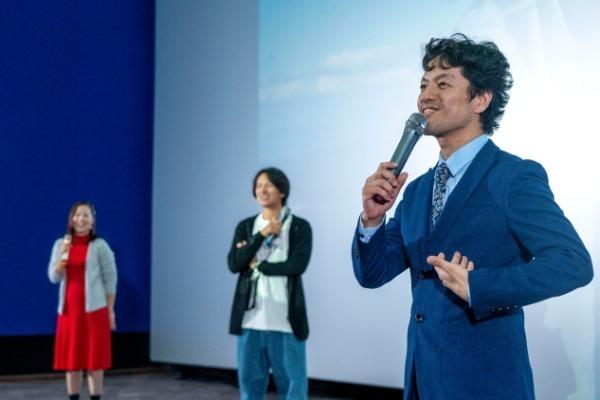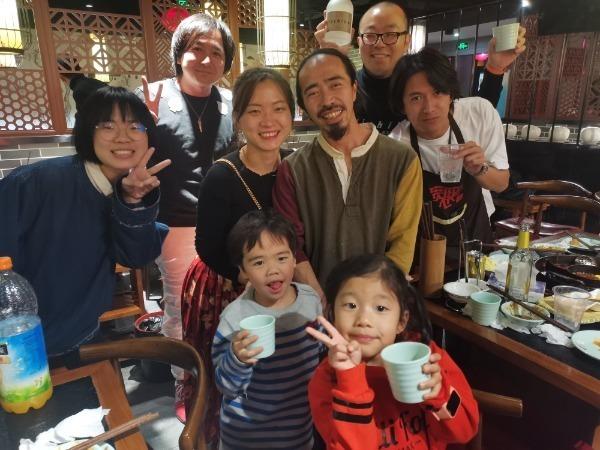 Japanese director Ryo Takeuchi (right), alongside his Chinese wife Zhao Ping and documentary host Tsuyoshi Abe, interacts with keen viewers of the documentary, The Reason I Live Here, at a fans meeting in Nanjing in December. (PHOTO PROVIDED TO CHINA DAILY)
Japanese director Ryo Takeuchi (right), alongside his Chinese wife Zhao Ping and documentary host Tsuyoshi Abe, interacts with keen viewers of the documentary, The Reason I Live Here, at a fans meeting in Nanjing in December. (PHOTO PROVIDED TO CHINA DAILY)
The past may be another country and for many people the future may be a new one. To live in another country is to embrace challenge. A new culture, new language, new climate and food, all take adjusting to. All can be challenging, all can be enriching. The reasons why many people choose to live outside their home countries can be complex, and in the hands of Japanese director Ryo Takeuchi, fascinating.
I really enjoy chronicling ordinary people’s lives. The shooting process is full of discovery, which is great fun. Each trip offers me a refreshing experience and each interviewee has something for me to learn from.
Ryo Takeuchi, Japanese director
He has visited hundreds of people who live outside their home borders and has filmed their daily lives and conducted candid, on-camera interviews. The result is The Reason I Live Here, a comprehensive insight into what makes a person move and what moves a person.
ALSO READ: An appeal beyond borders
The 41-year-old director has been living in Nanjing, Jiangsu province, with his Chinese wife, Zhao Ping, and their children, for seven years.
In the documentary, Takeuchi and the other host Tsuyoshi Abe are seen meeting people of all ages, from various walks of life. All have one thing in common. They live in a foreign land.
So far, some 200 episodes have been released. In each episode, a protagonist relives their daily routine and shares their thoughts with the hosts. They have their own answer to the same question raised at the end of each episode: “What’s the reason that you live here?”
 Chinese followers of the documentary attend a fans meeting in Beijing in December. (PHOTO PROVIDED TO CHINA DAILY)
Chinese followers of the documentary attend a fans meeting in Beijing in December. (PHOTO PROVIDED TO CHINA DAILY)
As a Japanese citizen who decided to settle down in Nanjing years ago, Takeuchi gave his own answer. “Initially, it was the eagerness to film a documentary,” he says. “As time passed by, it extended to my family, my colleagues, and our keen followers that I’ve been living with on this land.”
The director has won over numerous viewers with his realistic style of recording the authenticity in the lives of the relocated protagonists. They are a varied group. They include a 30-something Chinese visual-effects artist who started his English studies in Fiji; a Japanese drummer who sought success on the Chinese music scene; a Chinese farmer from Qiqihar, Heilongjiang province, who went to Fukushima, Japan, to grow vegetables, and a Japanese septuagenarian, who insists on offering free language tutorials at his restaurants in Wuhan, Hubei province.
The documentary, with its signature realistic style and unique perspective, has won a score of 9.3 out of 10 on the review site Douban.
A user of the platform comment ed: “The interviewees’ states of existence and their true emotions are genuinely captured when they are seen handling daily routines. Through watching the documentary, I could easily have a pragmatic look at their situations and then self-reflect on mine.”
To document reality in an objective way, Takeuchi doesn’t write scripts for filming. He prefers to use shots, scenes and sequences to con vey information rather than rely on voiceover.
Sometimes he picks interviewees at random. In one episode, for instance, he sat among dozens of young students in a class at a language school in Japan, to scout for new interviewees.
 The Chinese and Japanese members of the production team, including Abe (second row, first from right), gather for a meal. (PHOTO PROVIDED TO CHINA DAILY)
The Chinese and Japanese members of the production team, including Abe (second row, first from right), gather for a meal. (PHOTO PROVIDED TO CHINA DAILY)
A middle-aged Chinese man named Liao Ming caught his attention after Liao failed to correctly write down the hiragana alphabet from memory, which seemed easy to the other students.
After class, Takeuchi met Liao and was amazed to learn that Liao, a hardworking cook, had been living in Tokyo for 11 years, but he had poor language skills. What impressed him most was that Liao managed to live in Japan and run his own restaurants there for over a decade, despite the language barrier.
“I really enjoy chronicling ordinary people’s lives,” says Takeuchi. “The shooting process is full of discovery, which is great fun.”
He and the host Abe often play, drink and banter with their interviewees. This helps create a relaxed atmosphere conducive to a heart-to heart talk.
After selecting people to inter view, he visits their cities, their homes and workplaces, and meets friends and relatives.
“Each trip offers me a refreshing experience and each interviewee has something for me to learn from,” says the director.
The director has garnered more than 1.8 million followers on the Chinese microblogging platform, Sina Weibo. Many viewers actively interacted with him online, recommended interviewee candidates, and some even applied to join the team.
His goal is simple, he says. He’d feel a sense of success if these real life stories can help viewers to shatter any stereotypes they hold about people taking certain jobs or from certain countries. A large group of his interviewees are Japanese who live in China and Chinese people who’ve settled in Japan.
The origin of the journey
For his personal story, his decision to relocate to China started with a task assigned by Japan’s national broadcaster NHK in 2010, when he recorded the cultures, customs and lives of people who live on the banks of the Yangtze River. He traveled from its source on the Qinghai-Tibet Plateau and talked to local people at each stop. He realized that they knew little about modern-day Japan.
He wanted to foster more communication, so three years later, he and his family moved to Nanjing, to live with his Chinese wife’s parents. The couple set up a cultural company, aiming to produce more visual works related to cultural exchanges.
 Wan Binru, a Chinese member of the production team. (PHOTO PROVIDED TO CHINA DAILY)
Wan Binru, a Chinese member of the production team. (PHOTO PROVIDED TO CHINA DAILY)
The Reason I Live Here is their first key project, initiated in 2015, through which, they hope, Chinese viewers can learn more about Japanese people and vice versa.
To the delight of the director and his Chinese wife Zhao, many young people have joined their company with the same passion — to bolster international cultural exchanges between Chinese people and people from other countries. Many of their employees were initially fans who avidly follow the series, Zhao says.
“These young Chinese colleagues showed a keen desire to learn more about Japanese society, and Takeuchi is also curious about Chinese culture illustrated through the dialogue and deeds by the interviewees,” Zhao says.
Wan Binru, 23, an assistant director in the company, agrees that what Takeuchi has been doing in promoting mutual understanding between peoples from various countries is in tune with her dream.
Brought up in Nanjing since child hood, Wan has felt a national grief and profound hatred among her fellow countrymen toward the Japanese invaders during the War of Resistance Against Japanese Aggression (193145), particularly the criminals who carried out the six-week Nanjing Massacre in 1937, who slaughtered over 300,000 Chinese.
After some 80 years, many young people like Wan still bear in mind the national humiliation and grief, but on the other hand, they see the world as “one community with a shared future”, and call for more communication between all people of the world.
“I first visited Japan during my middle school years, and the trip sparked my interest in Japanese culture,” says Wan, adding that she also wanted to do something to foster more mutual understanding of the Japanese and Chinese cultures.
Wan acquired film production skills after graduating from the University of WisconsinMadison with a major in East Asian studies, Japanese language and communication arts, in 2018. She took a gap year afterward and toured around, during which time she got to know Takeuchi’s documentaries.
READ MORE: Beyond cultural borders
“I swiftly clicked with the direct or, and thought I should join the team,” Wan says, pointing out that Takeuchi focused on the everyday lives of individuals in a way that is easy to be comprehended by viewers of different ages.
“It’s a good idea that works well to forge people-to-people bonds, demolishing the invisible wall between them,” she adds.
Contact the writer at xingwen@chinadaily.com.cn


